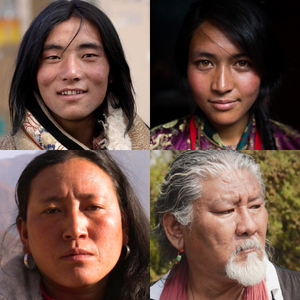Winja people: Difference between revisions
No edit summary |
(→Origin) |
||
| Line 46: | Line 46: | ||
===Origin=== | ===Origin=== | ||
The earliest references to a group identified by modern scholarship as the predecessors of the Winja appear as inscriptions on oracle bones dating to {{circa}} 1000 BCE. However, the name was dubiously was applied to a variety of groups; they might not be the same as the modern Winja. Nonetheless, it is possible that the modern Winja are descendants of one of the groups referred to as Winja in ancient times. | |||
Areas of Winja settlement are located mostly in central {{wpl|Qinghai}} and western {{wpl|Gansu}}, with a population also found in eastern [[Loulan]]. Throughout history, the Winja have been dominated by other powers, most notably the {{wpl|Tibetan Empire|Tibetan}} and {{wpl|China|Chinese}} empires. | |||
Modern Winja refer to themselves as ''Winja'' ([ wiːnʤa ]) in the northern parts of their range and ''Wenja'' ([ we̞ːnʤɐ ]) in the southern parts. | |||
===Ming dynasty=== | ===Ming dynasty=== | ||
Revision as of 23:52, 10 May 2019
 | |
| Total population | |
| 173,014 (2015) | |
| Regions with significant populations | |
| 149,010 | |
| 23,997 | |
| Languages | |
| First language Winja Second language Mandarin, Tokhari | |
| Religion | |
| Folk religion, Bon, Buddhism | |
^ Northern dialect ^ Sorthern dialect | |
The Winja people (Winja or Wenja; Mandarin: 溫加 wēnjiā) are an Indo-European ethnic minority group in China and Loulan who largely speak the Wenja language.
The Winja numbered about 149,010 people in the 2010 Chinese census, living mostly in Qinghai and Gansu provinces. An additional 23,997 reside in southeastern Loulan, where they number about 23,997 and where their language enjoys a protected minority status.
They are a patriarchal agricultural society and adhere predominantly to traditional tribal religions or to Buddhism.
History
Origin
The earliest references to a group identified by modern scholarship as the predecessors of the Winja appear as inscriptions on oracle bones dating to c. 1000 BCE. However, the name was dubiously was applied to a variety of groups; they might not be the same as the modern Winja. Nonetheless, it is possible that the modern Winja are descendants of one of the groups referred to as Winja in ancient times.
Areas of Winja settlement are located mostly in central Qinghai and western Gansu, with a population also found in eastern Loulan. Throughout history, the Winja have been dominated by other powers, most notably the Tibetan and Chinese empires.
Modern Winja refer to themselves as Winja ([ wiːnʤa ]) in the northern parts of their range and Wenja ([ we̞ːnʤɐ ]) in the southern parts.